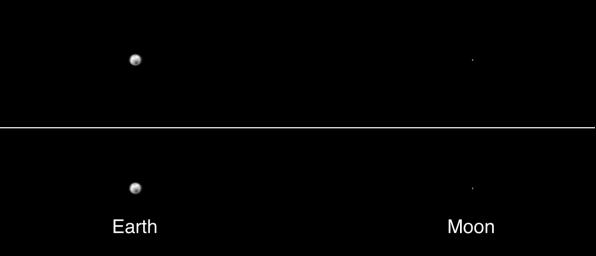The Earth and Moon As Seen by 2001 Mars Odyssey’s Thermal Emission Imaging System
Caption:
2001 Mars Odyssey's Thermal Emission Imaging System (THEMIS) took this portrait of the Earth and its companion Moon, using the infrared camera, one of two cameras in the instrument. It was taken at a distance of 3,563,735 kilometers (more than 2 million miles) on April 19, 2001 as the 2001 Mars Odyssey spacecraft left the Earth. From this distance and perspective the camera was able to acquire an image that directly shows the true distance from the Earth to the Moon. The Earth's diameter is about 12,750 km, and the distance from the Earth to the Moon is about 385,000 km, corresponding to 30 Earth diameters. The dark region seen on Earth in the infrared temperature image is the cold south pole, with a temperature of minus 50 degrees Celsius (minus 58 degrees Fahrenheit). The small bright region above it is warm Australia. This image was acquired using the 9.1 μm infrared filter, one of nine filters that the instrument will use to map the mineral composition and temperature of the martian surface. From this great distance, each picture element (pixel) in the image corresponds to a region 900 by 900 kilometers or greater in size or about size of the state of Texas. Once Odyssey reaches Mars orbit each infrared pixel will cover a region only 100 by 100 meters on the surface, about the size of a major league baseball field.
Cataloging Keywords:
| Name |
Value |
Additional Values |
| Target |
Earth |
Mars |
| System |
|
|
| Target Type |
Planet |
|
| Mission |
2001 Mars Odyssey |
|
| Instrument Host |
Mars Odyssey |
|
| Host Type |
Orbiter |
|
| Instrument |
Thermal Emission Imaging System (THEMIS) |
|
| Detector |
|
|
| Extra Keywords |
Grayscale, Infrared, Map, Moon, Thermal |
| Acquisition Date |
|
| Release Date |
2001-05-01 |
| Date in Caption |
2001-04-19 |
|
| Image Credit |
NASA/JPL/Arizona State University |
| Source |
photojournal.jpl.nasa.gov/catalog/PIA00559 |
| Identifier |
PIA00559 |

